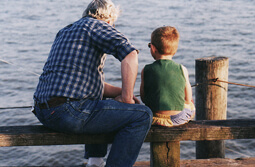Obituaries | Directions | Contact Us
Call 610-253-4678

Obituaries | Directions | Contact Us
Call 610-253-4678

 In the generations that our family has been caring for grieving families in the Easton area, we have learned some things about grief that you may find helpful. Here is advice for you as a mourner or as a caring friend. Always remember that you need not walk through your grief alone. There are many resources available to you, to connect you with caring friends.
In the generations that our family has been caring for grieving families in the Easton area, we have learned some things about grief that you may find helpful. Here is advice for you as a mourner or as a caring friend. Always remember that you need not walk through your grief alone. There are many resources available to you, to connect you with caring friends.
Mourning the death of someone you love is an individual experience. Although people around you will try to be helpful, their actions will not always be of comfort. Only you know what is helpful and what is not; you can decide for yourself what conversations and activities you wish to participate in, and what will have to wait until you are feeling more yourself again.
Going through grief is a process, and it usually doesn’t move in a straight line.
On the other hand, the hard work of mourning is less of a burden if you can share it with someone. Just as you may have had help with challenges like education and child-rearing, getting help now will make your pain more bearable. The understanding and support of family, friends, and counselors will help you. Please reach out for it.
It’s a fine thing to talk about your grief, if you can. It will help you heal. So find people who will listen to you — although if you wish to be silent, that is your right, too. Good listeners will not judge the many feelings and emotions you will be experiencing. It is perfectly normal to feel fear, relief, guilt, anger and disorientation all at the same time.
If you have family members or friends you are close to, they can lend a comforting, supporting ear, especially if they have been through a similar experience.
If you are a person of faith, you may find comfort talking to an empathetic church leader. They will understand that it is natural for you to be questioning many things right now.
Professional counselors and support groups are another important resource. You may be able to connect strongly with other people who have lived through similar circumstances. Good counselors will encourage you to talk about your loved one as much as you like.
Going through grief is a process, and it usually doesn’t move in a straight line. You’ll feel like you’re going backward as often as you go forward. But you need to keep moving forward, even if it’s a tiny bit at a time. You can help yourself along if you pay attention to certain things your grieving heart needs.
Your life has been changed forever by the death of your loved one. Of course it will take time to heal.
You can begin by working toward acknowledging the reality of the death. You will feel yourself moving back and forth between disbelief and acceptance, and replaying the important moments and memories. Give yourself permission to accept it as true, even if you have to do so just a little bit at a time.
Find ways to express your thoughts and feelings of pain as you move toward accepting the finality of your loss. Doing this in episodes, repeatedly over time, will help you come to terms with the pain.
Find out who you are now. If your life was closely intertwined with your loved one, you will need to begin working on a new self-identity. Although that may sound frightening, you will find that it also has positive aspects. Allow yourself to grow into the new person life is creating for you.
Remember your loved one. Don’t shut off the natural flow of memories, both happy and sad, that keep you connected. Look at picture albums, remember stories, talk about him or her to your friends. Embracing your memories is another way you can help yourself toward healing.
Ask the hard questions. Even though no one really has the answer to why this happened, it is natural and healthy to keep looking for meaning and purpose. As you build your new life, you will be surprised to find yourself slowly coming to terms with these questions in unexpected ways. So keep searching.
Take care of yourself. Our bodies seem to have hidden strengths to help us rise to the occasion when needed. But when that wears off, you may experience more fatigue than usual. Take extra-good care of yourself. Eat healthy, well-balanced meals. Get plenty of rest, maybe even allow yourself to take naps. Do only those activities you feel ready to do, even if it means turning down the offers of well-meaning friends. Listen to your body, and respect what it is telling you.
Have patience. There is wisdom in the saying, “Time heals all wounds.” Your life has been changed forever by the death of your loved one. Of course it will take time to heal. So give yourself grace. And this may be the best advice of all.